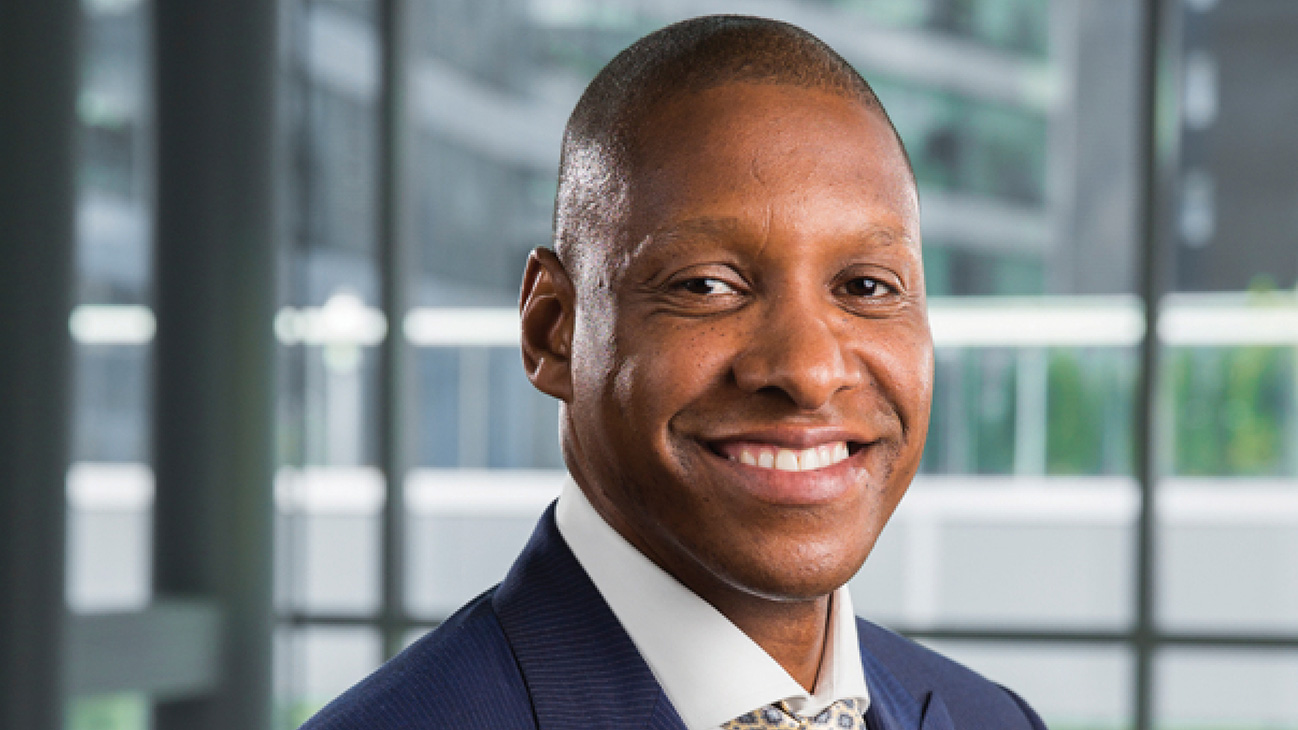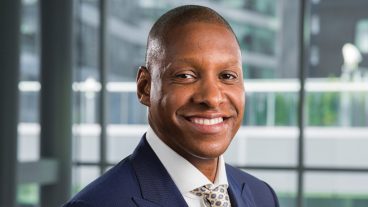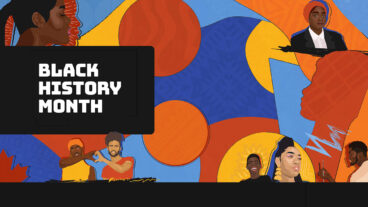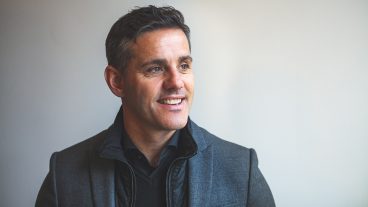It’s no secret that under Masai Ujiri’s leadership, the Toronto Raptors have experienced their most successful period in franchise history. He turned what was a losing team into NBA champions, securing their first title after a six-game victory against the Golden State Warriors in June 2019. Since then, Masai has been focused on accomplishing what’s even harder — win again.
In a recent edition of the Globe and Mail’s Report on Business (ROB), Masai was named the real MVP of the Raptors. He has become the face of the franchise — a role traditionally held by the players, ROB writes — with a high level of trust from ownership and fans alike. He took what was considered a small-market team and turned it into one of the 10 most valuable NBA franchises, increasing their valuation by 517%.
For their cover story, ROB followed Masai to learn more about his day-to-day schedule as the president and vice-chairman of the Toronto Raptors; founder of Giants of Africa; a keynote speaker; and, of course, as a leader within his community. Below are some highlights from the article:
Masai Ujiri: The President and Vice-Chairman of the Toronto Raptors
“Masai Ujiri has many qualities as an executive. There’s the dealmaking that makes other execs wary of trading with him (transforming middling guard Greivis Vásquez into two key players on a championship team remains a shocking robbery, even seven years later). There’s the brand-building that turned the “We the North” Raptors into Canada’s Team. There’s the eye for talent that saw future All Stars in unheralded prospects like Siakam and Fred VanVleet. But those who work with him say it’s Ujiri’s ability to connect with people and inspire them toward a collective purpose that is his singular genius.
“‘He’s incredibly charismatic,’ says [Bobby] Webster, [general manager of the Toronto Raptors]. ‘He makes you feel like you’re a part of what he’s part of.’ In 2013, Webster was a 28-year-old salary-cap wunderkind working at the NBA head office. He’d been offered other front office jobs, but Ujiri was the one who convinced him to make the move and join him with the Raptors. Teresa Resch, now a vice-president with the team, was also part of that original team. Ujiri had only met her a few times, but he’d made an impression on Resch. ‘He’s a great connector,’ she says. ‘He’ll meet you and you’ll feel like you have a connection with him.’”
Masai Ujiri: The Founder of Giants of Africa
“In 2022, you can see a clear non-NBA path laid out for him, if he wants it. His charity Giants of Africa continues to grow, and each offseason Ujiri leads camps and builds basketball courts across the continent. He moderates panels at United Nations conferences, hobnobs with politicians, has multiple world leaders on his phone — not just Obama but Justin Trudeau and President Paul Kagame of Rwanda. Success has brought with it a certain gravitas, and at times he carries himself more like an ambassador or statesman than a basketball executive…”
“One evening in early September, I follow Ujiri to a Giants of Africa event in a soaring atrium in downtown Toronto. Ujiri created the event, AfriCAN, as a networking for African professionals in the city and to help fuel economic development on the continent. Afrobeats music fills the space while more than 300 jubilant guests drink from an open bar and eat small plates of fried sea bream and spiced beef gumbo. Raptors forward Precious Achiuwa and rapper Shad bump elbows with Uber drivers and small business owners. The whole thing feels like an outgrowth of Ujiri’s animating philosophy: If you can connect people, bring them together, who knows what you might achieve?…
“When Ujiri enters the room, he is immediately surrounded. He eventually takes to the stage, looks out on the crowd and seems genuinely moved. ‘I am apologizing to all Africans in Toronto for not doing this sooner,’ he says.”
Masai Ujiri: The Keynote Speaker
“The last time I meet with Ujiri, it’s at a corporate speaking gig in a hotel ballroom filled with accountants and tax consultants. He and his people arrive at the Royal York Hotel and move through the space like a practised SWAT team — his security guard John scoping out the hallway, his publicist locking step with him as they head toward the elevator, assistant trailing behind.
“Backstage, Ujiri is introduced to the organizer. He’s introduced to the stage manager, to the person who will introduce him, to the woman in a blazer who won a company-wide contest to interview him onstage and who now, frankly, looks terrified, staring blankly into the middle distance clutching a water bottle. Ujiri looks them each in the eye and smiles, touches his hand to his heart. And then he’s out to a standing ovation from a ballroom full of mostly middle-aged, mostly white accountants in lanyards.
“Everyone here is trying to do the same thing I am — glean leadership knowledge from someone who is very good at leading. We all want to understand what makes him a successful executive, a winner, and to take that knowledge home with us in a few digestible, transferable lessons.
“On stage, Ujiri is happy to oblige. He busts out some of what I’ve come to recognize as core Masai-isms. ‘Show more passion than ambition,’ he says, an elegant index finger raised in the air. ‘You need an organization that’s full of leaders,’ he says, so hire people who are smarter than you. ‘Win,’ he says, over and over. ‘We win on the court. We win off the court. And when you do, you bring other people along.’
“In the ballroom, this all goes over great. Ujiri has figured out how to take his genius for personal connection and reproduce it at scale.”
Masai Ujiri: The Community Leader
“Here’s what Ujiri did after the Oakland footage became public: He tried to take his personal experience and turn it into something bigger.
“He couldn’t stop thinking about the people who got tangled up in the criminal justice system and didn’t have what he had — the best lawyers in the world, money and celebrity. His team found a group called The Bail Project, a non-profit that pays bail for people, and he made a big donation. But that kind of help-at-a-distance is never enough for Ujiri. He doesn’t just want to fund a basketball camp in Mogadishu — he wants to be out on the court with the kids. So Ujiri flew out to Chicago.
“In his office, he tells me the story of the man he met there. This isn’t something he’s really spoken about before, not something he did for publicity, but we’ve somehow gotten here, and now he wants me to understand what the encounter meant to him. So the man, let’s call him Sid, is diabetic. He’s gay and has a loving partner. And during the pandemic, Sid lost his job, lost his insurance and began rationing his insulin. ‘He had one of those attacks, you know?’ He was out on the street, acting erratic, and he tried to enter a car he thought was his own. The police arrested him. For days he was in prison. ‘His partner could not find him.’ Eventually the bail project intervened. They found him in the system, paid his bail, brought him home.
“That was the man Ujiri flew out to meet. He walked into his apartment. ‘The first thing I saw was bananas. He loves bananas. I love bananas,’ says Ujiri. ‘He has two watches on. He loves watches. I love watches.’ Sid loved photography, just like Ujiri. And they had both, in their own way, had an experience with the law that made them feel as if everything they’d worked for in their lives could be taken from them. That was something they talked about, too. The two men were objectively extremely different. But all Ujiri could see when he walked in the door was what they had in common.
“I ask him: What was the purpose of that meeting? What did he hope it would achieve, for either of them? He seems genuinely baffled by the question. The value is, to him, self-evident. ‘Well for me, I found a friend,’ he says. ‘I think he did, too.’ Now, when he goes to Chicago, he checks up on Sid. That’s one more person on his team. He made a connection — another link in Ujiri’s vast and growing chain of personal relationships. The benefits go without saying. That’s how you win.”
The ROB article dives further into Masai’s experience during and after he was wrongfully charged with battery of a peace officer at the 2019 NBA championship, as well as his general leadership and performance philosophies. Read the whole piece here.
As a keynote speaker, Masai shares his insight into leadership, building strong business cultures, women empowerment, social justice, and more. Contact us to learn more about Masai and how to bring him to your next event.




